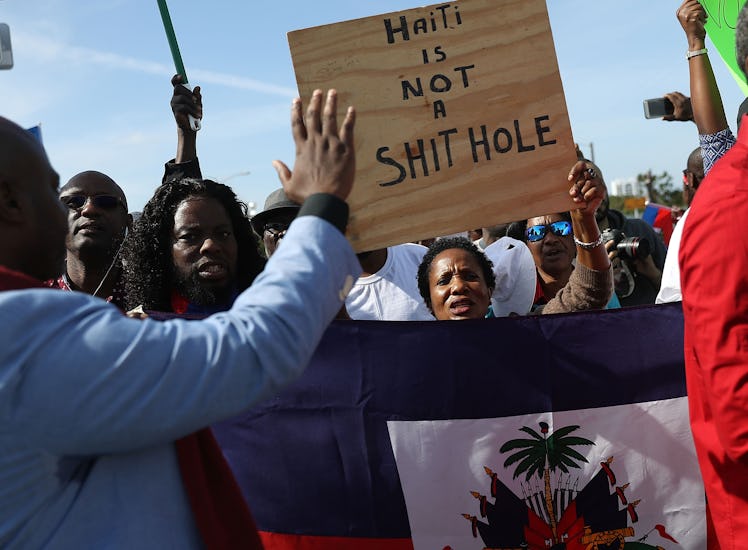
Here's How President Trump's "Sh*thole" Comment Could Affect The Travel Ban
There's little question that alleged comments made by President Donald Trump in an Oval Office meeting on Thursday, Jan. 11 could have far-reaching implications. Whether true or not, the reports of his expletive-laden comment while meeting with lawmakers to discuss the fate of young immigrants has already spurred controversy. Among the potential fallout: that Trump's "sh*thole" comment could affect the travel ban's standing in court.
Trump has denied calling Haiti and African nations "sh*thole countries," as he was reported saying Friday, Jan. 12 in The Washington Post. Those present at the meeting have come out with varying accounts of what he actually said. while the Post said White House officials did not dispute the account. The alleged quote was in the context of discussing Deferred Action for Childhood Arrivals (DACA), the program that allows immigrants brought to the country as children to continue living and working without deportation. If accurate, the quote could have bearing on Trump's travel ban, experts say.
The travel ban, which has undergone a roller coaster of a saga, was set in motion in January 2017 via an executive order signed by the president. It banned travelers from seven predominatly Muslim countries from entering the U.S., and various courts have repeatedly struck down subsequent versions of the ban. In December 2017, the Supreme Court ruled that the travel ban, now in its third iteration, could go into effect while lower courts continued to hear cases against it. At issue is whether the ban was in fact unconstitutionally targeted at discriminating against a certain category of people.
Some legal experts are arguing that Trump's latest comment, if true, would add fuel to the argument that the ban was discriminatory.
Supreme Court lawyer Neal Katyal, one of the legal minds leading the charge against the travel ban, is one of them. In a tweet from Jan. 12, he quoted Trump's alleged comment in a tweet on Jan. 12, hinting at the comments' legal vulnerability in the case. "The 1965 law at issue in the travel ban case: 'No person shall...be discriminated against in the issuance of an immigrant visa because of...nationality.'8 USC 1152," he continued. "Thank you @realDonaldTrump."
ABC quotes UCLA Law professor Hiroshi Motomura, an author of two books on immigration law and policy. Motomura says the alleged Jan. 12 comment is more evidence for those fighting the ban: "Yesterday's statement makes it more reasonable for courts to decide that the travel ban can be struck down as unlawful — beyond the president's authority under immigration statutes, and as unconstitutional — without necessarily intruding on the national security authority of a president who exercises that authority in a nondiscriminatory and rational way."
Other legal scholars, per ABC, feel that there's already evidence out there to point to potential discrimination on religious grounds. In the campaign, for example, his team had promised a "total and complete shutdown of Muslims entering the United States." So the "sh*thole" comment is, in one way, just more of the same; if none of that ends up being enough to sway judges, it's unlikely this latest comment would, either.
Harvard Law professor Laurence H. Tribe doesn't seem confident that the "sh*thole" comment would do much in court simply given who's on the bench making the final decision.
"In a reasonable SCOTUS, Trump's racist remarks today about immigrants from 'shithole' countries would greatly weaken his phony defense of the travel ban," wrote Tribe in a Jan. 11, referring to the Supreme Court justices. "In today’s SCOTUS, it's a crapshoot."
The New York Times reports the travel ban took effect on Dec. 4 per the Supreme Court ruling, and affects most travelers from Iran, Somalia, Yemen, Chad, North Korea, Libya, and Syria. But a Ninth Circuit Court ruled against it later that month, ABC reports, and a ruling from another court is still forthcoming.
Regardless of the appeals, the effects are still being felt. Even before Trump's anti-immigration comment, people were posting on Twitter about how the travel ban was affecting others, themselves, and their families.
Former U.S. ambassador the United Nations Samantha Power also shared a heart-wrenching account.
Whether the president's comments will indeed have any sway over the cases working their ways through the lower courts, as Tribe suggests, is anyone's guess.